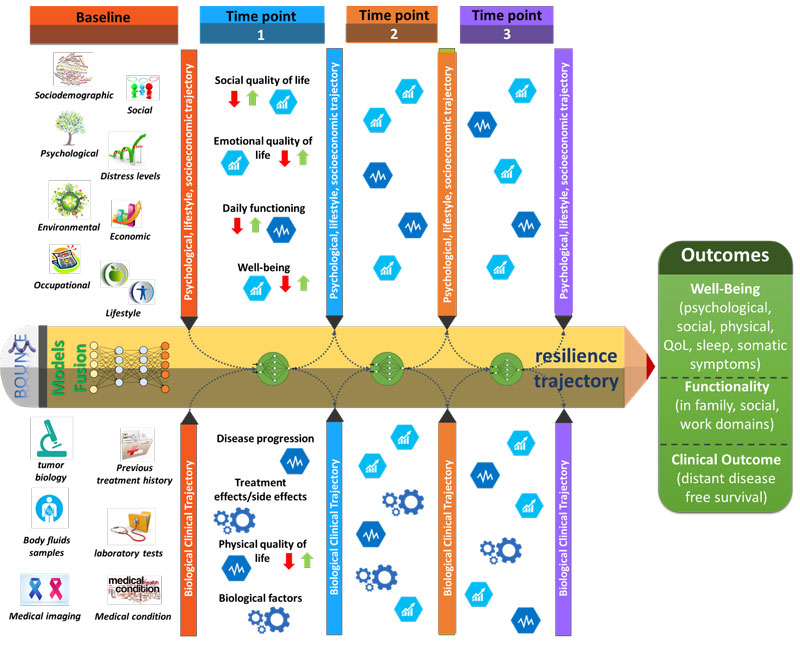The broad and general objective of the BOUNCE project is to build a quantitative mathematical model of factors associated with optimal adjustment capacity to cancer. Special emphasis is given to modifiable factors associated with optimal disease outcomes. At the core of the project is a prospective multi-centre clinical pilot at four major oncology centres: European Institute of Oncology in Italy, Helsinki University Hospital in Finland, Rabin Medical Center and Shaare Zedek Medical Center coordinated by the Hebrew University of Jerusalem in Israel, and Champalimaud Foundation in Portugal.
The study is currently recruiting over 660 breast cancer patients with stage I-III histologically confirmed diagnosis. There will be seven assessment waves over a period of 18 months: baseline, completed after the first visit to the oncologist, and Months 3, 6, 9, 12, 15, and 18. At baseline only non-cancer-specific measures are administered (such as optimism and self-efficacy). Cancer-specific measures are first administered at Month 3, when the patient has already had some meaningful experience with the illness. Measurement sessions at baseline and at Month 12 will involve face-to-face interviews with a health-care professional-researcher. During the first face-to-face encounter the researcher will demonstrate the electronic platform designed for BOUNCE to facilitate data collection as described below. For patients who find it difficult to use the electronic platform a paper-and-pencil version of the questionnaires is available.
Within the multicentre clinical pilot, information about the biomedical status, the psychosocial status and the functional status of breast cancer patients will be collected. The primary end-point of the BOUNCE clinical pilot is to identify factors and processes that may predict both interim and long-term patient resilience, their physical wellbeing and psychological outcomes of cancer and cancer treatment. The design of the study will allow researchers to address several secondary aims: (i) Identify processes and interactions that can more accurately predict final (i.e., at 18 months) and intermediate (i.e., at 3, 6, 9, 12 and 15 months) psychological outcomes; (ii) Develop a multi-dimensional index of resilience as a function of the biomedical status, the psychosocial status and the functional status of the patient; (iii) Apply statistical models to understand complex interactions of variables both within and across measured domains (e.g., from personality traits to health outcomes, through health-related beliefs and behaviour, with socio-demographic and cultural variables as moderating conditions) in order to gain an enhanced understanding of the dynamic process of adaptation to breast cancer, and resilience-as-a-process; (iv) Perform cost-benefit analysis assessing the strengths and limitations of the project outcomes and also determine the best approach to achieve the maximum benefits.

By Dr Kettie Mazzocco, Psycho-oncologist, European Institute of Oncology, Milan, Italy
The BOUNCE multicenter clinical pilot is currently recruiting over 660 breast cancer patients with stage I-III histologically confirmed diagnosis. Assessments of the biomedical, psychosocial and functional status of participating women are obtained at 7 time points over a period of 18 months. Among other goals the study aspires to allow researchers to:
- Develop a multi-dimensional index of resilience as a function of the biomedical, the psychosocial and the functional status of the patient,
- Enhance our understanding of the dynamic process of adaptation to breast cancer, and
- Assess the cost-benefit values of personalized clinical efforts to enhance resilience.
